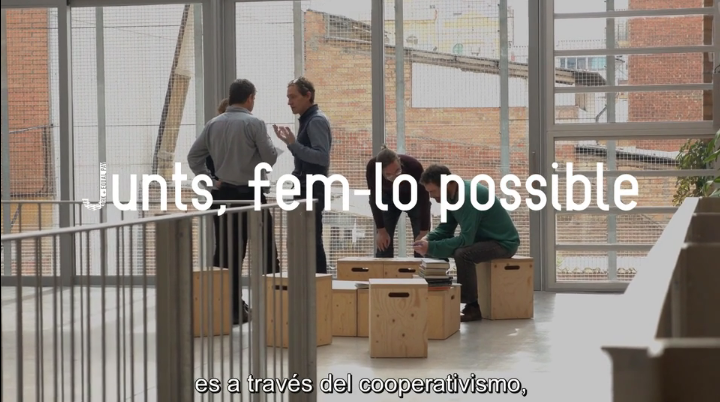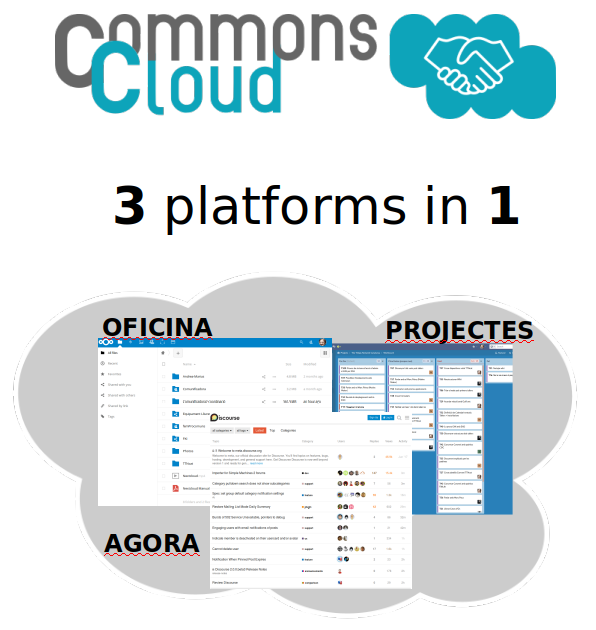Contributing £ 9
I want to contribute 10
2 stickers + we add you to the list of credits and thankyous of the co-production of the platform!
> 11 Co-financiers
Goteo ha construido una historia única en el mundo del micromecenazgo. ¿Quieres seguir formando parte de ella?
CommonsCloud


 Min.
Min.
 Opt.
Opt.

2 stickers + we add you to the list of credits and thankyous of the co-production of the platform!
like the previous one + t-shirt - access to the Agora + workshop to get to know the CommonsCloud
2 stickers + t-shirt - access to the Agora + workshop to get to know the CommonsCloud + credits and thankyous
1 account with 1 GB + recognition in the credits and widget of CommonsCloud Pioneer + 2 stickers
5 stickers + poster + we add you to the credits and thankyous of the co-production of the platform!
1 account with 5 GB + recognition in the credits and widget of CommonsCloud Pioneer + 2 stickers + 1 t-shirt
1 account with 5 GB + recognition in the credits and widget of CommonsCloud Pioneer + 2 stickers + 1 t-shirt + 2 participant tickets for the BBQ party!
5 accounts of 1 GB + 10 stickers + 2 posters + participation in the CommonsCloud workshop for the 5 users + we add you to the list of credits and thankyous of the co-production of the platform!
we meet a morning or afternoon and transfer everything necessary to replicate each and everyone of the services. Let's help to decentralise the cloud!
10 accounts of 1 GB + 3 t-shirts + 2 posters + participation in the CommonsCloud workshop for the 10 users + we add you to the list of credits and thankyous of the co-production of the platform!

CommonsCloud is an online collaborative platform, an alternative to proprietary software platforms like Google Drive, but respectful with privacy and it doesn't commercialise your data. The ambition of the CommonsCloud project is to offer an alternative to proprietary cloud platforms, under the control of its users, replicable as free software and well documented. This is collaborative web applications to edit, store and share documents, agendas, manage projects and facilitate debate and decision-making. The way we do this is through an alliance of collectives committed to free software and digital sovereignty, building on the best web applications that are already out there and bring them together in a user-friendly environment where people help each other, enhance their awareness regarding the power of self-governance and sovereignty.
Since we started the crowdfunding campaign at Goteo, many of you are asking us how did we start to develop this project. Let's take a dive into where we come from, which free software building blocks we have chosen so far and how they come together. This is a summary from a larger article that we published at the Free Knowledge Institute blog.
Brief history
We didn't want to reinvent the wheel, or our ambition would have little chances to become real. We can say that all collectives participating in the CommonsCloud Alliance have their own experiences self-hosting their free software web applications, from wikimedia instances to taiga, RedMine or WeKan boards for kanban/agile self-management of projects. From ownclouds to NextClouds and from Asterisk (VoIP) to Etherpad or RocketChat servers. The thing with all these webapps is that if we manage them individually, our users typically need to register many different accounts and collaboration between collectives is rather limited. And there are so many web applications that keeping up to date on all of them is a job on its own, not something that one can do alone. So there's a need to build this together, especially as the tools and networks of the corporate masters are very powerful and it isn't easy to seduce people away from them.
So how did we start the CommonsCloud? The first meeting we had was in January 2017: we got together with 10 people from different collectives in Barcelona to lay the foundations. We have put in common the experiences as briefly reviewed above. After a co-creation session at the Mobile Social Congress in Barcelona in 2017 we set up an international working group, on the FKI wiki and the CommonsCloud mailing list. From there, the work has continued on- and offline, in parallel with the set up of the femProcomuns cooperative, until now, when both are ready to take the next step: enter the production phase.
Three platforms in one
Based on user demand we prioritised three main areas of applications with a "winner" in each area that we considered as the most solid and strategic choice for that area.
Phabricator - as the community PROJECTS self-management platform
Phabricator is a platform to manage projects, that allows open/closed, volunteer/professional teams and communities to organise their work with agile methodologies and Kanban workboards (like Trello, Wekan, Kanboard) with a few dozens of complementary applications that one can integrate easily within a group if so desired. It also ofers a locker to store passwords and other secrets, a hierarchical wiki and a documentation engine, a survey tool, notepad, badges, blogs, etc Members of the Barcelona: Free Software association (part of the alliance) shared the experience of the global KDE community who uses Phabricator to manage software development with its code repository toolset; the Wikipedia community also runs its own Phabricator instance. As you can appreciate, Phabricator is not just for code development (like github) but provides an extensive toolset for non-technical teams to self-manage their community production work.
NextCloud as the core online OFFICE platform
NextCloud is the community fork of ownCloud and many consider it the best of online cloud platforms, where one can store and share files, calendars, and contacts. With the appropriate plugins, online editing of office documents can be integrated. This we consider the killerapp that our users need to migrate from Google's Drive. There are several options here to edit online documents. At this moment we have integrated the CollaboraOffice online LibreOffice server for that purpose. There are also other options, such as Only Office, that can do that job. We are collectively exploring what's the best solution on this front. We know for sure that many of our users need to collaboratively edit online office documents, or Google Drive will remain their "friend".
NextCloud has recently incorporated the so called "Circles", which allow users to define and self-manage usergroups whith whom they can quickly share documents. At the same time we are exploring the Groups option that we manage through the LDAP directory, where users of a certain collective can automatically have access to the collective's file share, calendar and group contacts.
While it is true that NextCloud has lots of other apps that can be added through plugins, right now we haven't activated them. We first want to have the pioneering userbase to get used to the three core platforms and then sit together to see which features and apps we think are best to have and in what ways.
One of the most wonderful things of NextCloud is its synchronisation of files, calendars and contacts between the server and one's mobile, tablet, laptop and desktop. When editing a document online, one may decide to continue through one's local LibreOffice installation, synch the files automatically and continue on any of the synched devices, automatically the whole team has access to the latest version of any shared document, without additional human intervention.
Discourse as the AGORA, the platform for online debate and collective decisionmaking
Online discussion needs a good platform to convince people with so many different experiences. Some are fans of online forums, others of mailing lists. Discourse combines them both into a flexible and userfriendly environment. We found it a very decent complement to the other core platforms.
If you want to know more about the different platforms we tested and how we are working to improve the user experience, please go to the full article here.
Inicia sesión para dejar un comentario
I want to contribute 10
2 stickers + we add you to the list of credits and thankyous of the co-production of the platform!
> 11 Co-financiers
I want to contribute 20 [PROMO EARLY BIRD]
like the previous one + t-shirt - access to the Agora + workshop to get to know the CommonsCloud
> 10 Co-financiers
I want to contribute 30
2 stickers + t-shirt - access to the Agora + workshop to get to know the CommonsCloud + credits and thankyous
> 11 Co-financiers
I want to be part of it 40
1 account with 1 GB + recognition in the credits and widget of CommonsCloud Pioneer + 2 stickers
> 24 Co-financiers
We want it to happen 50
5 stickers + poster + we add you to the credits and thankyous of the co-production of the platform!
> 04 Co-financiers
I want to be part of it 70
1 account with 5 GB + recognition in the credits and widget of CommonsCloud Pioneer + 2 stickers + 1 t-shirt
> 25 Co-financiers
I want to be part of it 100
1 account with 5 GB + recognition in the credits and widget of CommonsCloud Pioneer + 2 stickers + 1 t-shirt + 2 participant tickets for the BBQ party!
> 06 Co-financiers
We want to be part of it 150
5 accounts of 1 GB + 10 stickers + 2 posters + participation in the CommonsCloud workshop for the 5 users + we add you to the list of credits and thankyous of the co-production of the platform!
> 06 Co-financiers
Replicate the CommonsCloud workshop
we meet a morning or afternoon and transfer everything necessary to replicate each and everyone of the services. Let's help to decentralise the cloud!
> 01 Co-financiers
We want to be part of it 300
10 accounts of 1 GB + 3 t-shirts + 2 posters + participation in the CommonsCloud workshop for the 10 users + we add you to the list of credits and thankyous of the co-production of the platform!
> 04 Co-financiers
We look for volunteers to translate the platform into Spanish and Catalan, and for some parts native English translaters will also be very welcome!
We are broadening our network of developers: we want to share and learn from you! There're lots of things that can be improved. Shall we meet at the p
Will you tell us what tools or features you would like to have?
Do you like the project, do you share the mission? Will you help us to promote the project? Tell us what channels and networks you have access to and